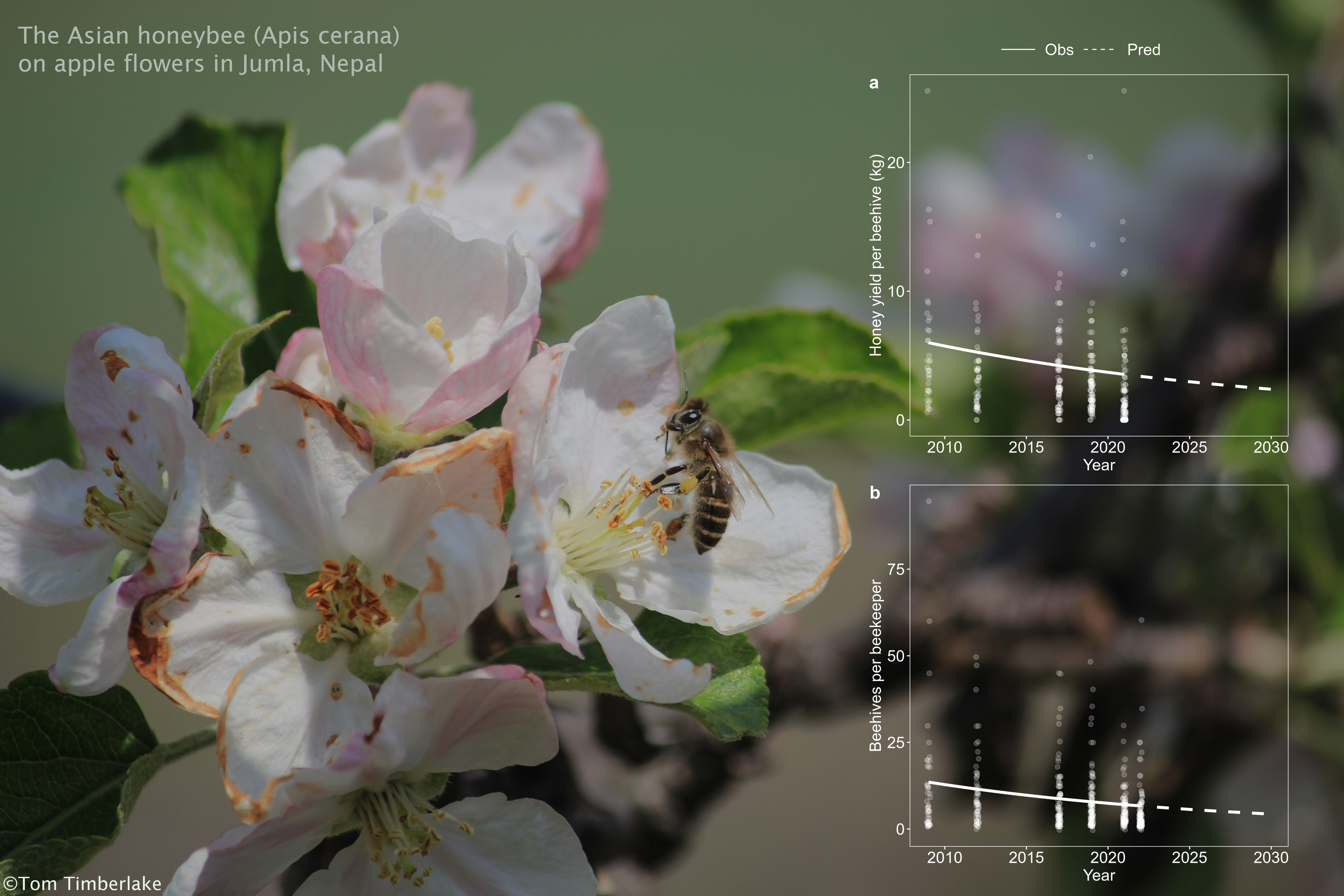Publications
2025
Ståhl PPG , Puntila-Dodd D R, Zhang L, Nordström MC, Kortsch S (2025) Food web robustness depends on the network type and threshold for extinction. Oikos e111392024
Qian G, Wu D, Zhang L, Kortsch S (2024) Temperature variability regulates the interactive effects of warming and pharmaceutical contaminants on community stability. Journal of Theoretical Biology , 595: 111948.
Timberlake TP, Cirtwill AR, Sapkota S, Bhusal DR, Devkota K, Karki R, Joshi D, Saville NM, Kortsch S, Baral S, Roslin T, Memmott J (2024) Agricultural specialisation increases the vulnerability of pollination services for smallholder farmers, Journal of Applied Ecology (Early View)
Rollin G, Kortsch S, Lages J, Gauzens B (2024) Identifying important species in meta-communities. Methods in Ecology and Evolution , 00: 1–13.
Marina T. I, Saravia L. A, Rodriguez I. D, Funes M, Cordone G, Doyle S. R, Silvestro A, Galván D. E, Kortsch S, Momo F (2024) The response of trophic interaction networks to multiple stressors along a large-scale latitudinal range in the Southern Hemisphere. Environmental Reviews
Just-IN https://doi.org/10.1139/er-2023-0132

Kortsch S, Cirtwill A, Timberlake T, Galaviz VE, Roslin T, Memmott J, Sapkota S, Saville N. Decline of honeybees in western Nepal and its consequences for pollination and crop production.
Insects 15: 281.
Gauzens B, Rosenbaum B, Kalinkat G, Boy T, Jochum M, Kortsch S, O’Gorman E J, Brose U. (2024) Adaptive foraging
behaviour increases vulnerability to climate change. Nature Climate Change , 1-6.
Marina T, Saravia, Kortsch S (2024) New insights into the Weddell Sea ecosystem applying a qunatitative network approach. Ocean Science 20: 141-153
2023
Novotny A, Serandour B, Kortsch S, Gauzens B, Winder M. (2023) Integrating DNA metabarcoding and biomonitoring data
reveals trophic pathways of primary production in a flux-balance marine food web. Science Advances 9, eadg1096 https:/DOI:10.1126/sciadv.adg1096
Kortsch S, Saravia S, Cirtwill A, Timberlake T, Memmott J, Kendall K, Roslin T, Strona G. (2023) Landscape composition and pollinator traits interact to influence pollination success in an individual-based model. Functional Ecology, 37: 2056-2071. https://doi.org/10.1111/1365-2435.14353
2022
Wu D, XU C, Wang S, Zhang, L, Kortsch S (2022) Why are biodiversity ecosystem functioning relationships so elusive? Trophic interactions hinge on aquatic ecosystem function variability.Journal of Animal Ecology:00,1–10. https://doi.org/10.1111/1365-2656.13808 pdf
Timberlake TP, Cirtwill AR, Baral SC, Bhusal DR, Devkota K, Harris‐Fry HA, Kortsch S, Myers SS, Roslin, R, Saville NM, Smith MR, Strona G, Memmott J (2022) A network approach for managing ecosystem services and improving food and nutrition security on smallholder farms. People and Nature, 4:563-575. https://doi.org/10.1002/pan3.10295
Frelat R, Kortsch S, Kröncke I, Neumann H, Nordström MC, Olivier P and Sell AF (2022) Food web structure and community composition: a comparison across space and time in the North Sea. Ecography: e05945. https://doi.org/10.1111/ecog.05945 pdf
2021
Kortsch S, Frelat R, Pecuchet L, Olivier P, Putnis I, Bonsdorff E, Ojaveer H, Nordström MC (2021) Disentangling temporal food web dynamics facilitates understanding of ecosystem functioning Journal of Animal Ecology: Early View, e1551 . Open access. doi: 10.1111/1365-2656.13447
2020
Keck A, Kortsch S, Bluhm B, Beuchel F, Gulliksen B, Primicerio R (2020) Arctic coastal benthos long-term responses to perturbations under climate warming. Philosophical Transactions of Royal Society A, 378:20190355. https://doi.org/10.1098/rsta.2019.0355
Pecuchet L, Blanchet M-A, Frainer A, Husson B, Jørgensen LL, Kortsch S, Primicerio R (2020) Novel feeding interactions amplify the impact of species redistribution on an Arctic food web. Global Change Biology, 26:4894-4906.
2019
Olivier P, Frelat R, Bonsdorff E, Kortsch S, Kröncke I, Möllmann C, Heumann H, Sell AF, Nordström MC (2019) Exploring the temporal variability of a food web using long-term biomonitoring data. Ecography, 42: 2107-2121.
Pecuchet L, Lindegren M, Kortsch S, Otto S, Putnis I, Jurgensone I, Nordström MC (2019) Spatio-temporal dynamics of multi-trophic communities reveal ecosystem-wide functional reorganization. Ecography, 43:197-208.
Blanchet MA, Primicerio R, Kortsch S, Dolgov AV, Fossheim M, Eriksen E, JørgensenLL, Mauritzen M, Aschan M (2019) The role of marine mammals in the Barents Sea food web. ICES Journal of Marine Science, 76:i37-i53.
Kortsch S, Primicerio R, Aschan M, Lind S, Dolgov A, Planque B (2019) Food web structure changes along environmental gradients in a high-latitude marine ecosystem. Ecography, 42:558-566.
2017
Frainer A, Primicerio R, Kortsch S, Wiedmann M, Dolgov AV, Aschan M (2017) Fish communities under rapid functional change in the Arctic. Proceedings of the National Academy of Sciences , 114:12202-1220.
Strona G, Veech JA, b>Kortsch S, Matthews TJ (2017) NOS: a software suite to compute node overlap and segregation in ecological networks. Ecography, 41: 558-566
2016
Yen D L Y, Cabral R B, Cantor M, Hatton I, Kortsch S, Patrício J, Yamamichi M (2016) Linking structure to function in food webs: maximation of different ecological functions generates distinct food web structures. Journal of Animal Ecology, 85:537-547.
2015
Kortsch S, Primicerio R, Fossheim M, Dolgov A, Aschan M (2015) Climate change alters the structure of arctic marine food webs due to poleward shifts of boreal generalists. Proceedings of Royal Society Biological sciences, 282:20151546.
This paper was featured in a news article in Nature: Blanchard J (2015) Climate change: A rewired food web Nature 527:173-174.
2014
Planque B, Primicerio R, Michalsen K, Aschan M, Kortsch S, Certain G, Dalpadado P, Gjøsæter H, Hansen C, Johannesen, Jørgensen LL, Kolsum I, Leclerc L-M, Omli L, Wiedmann M (2014) Who eats whom in the Barents Sea: a food web topology from plankton to whales. Ecology, 95:1430-1430.
2012
Kortsch S, Primicerio R, Beuchel F, Renaud P E, Rodrigues J, Lønne O J, Gulliksen B (2012) Climate-driven regime shifts in Arctic marine benthos. Proceedings of the National Academy of Sciences PNAS , 35:14052-14057.